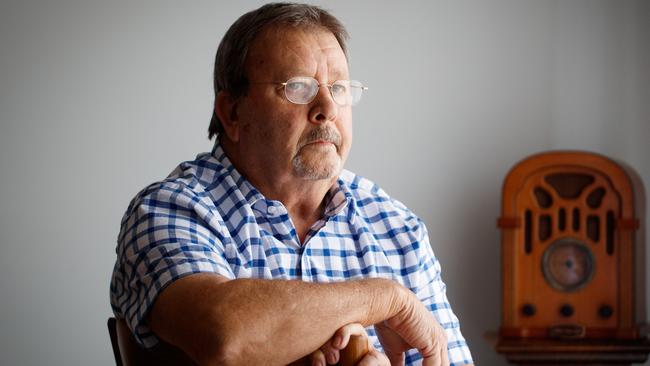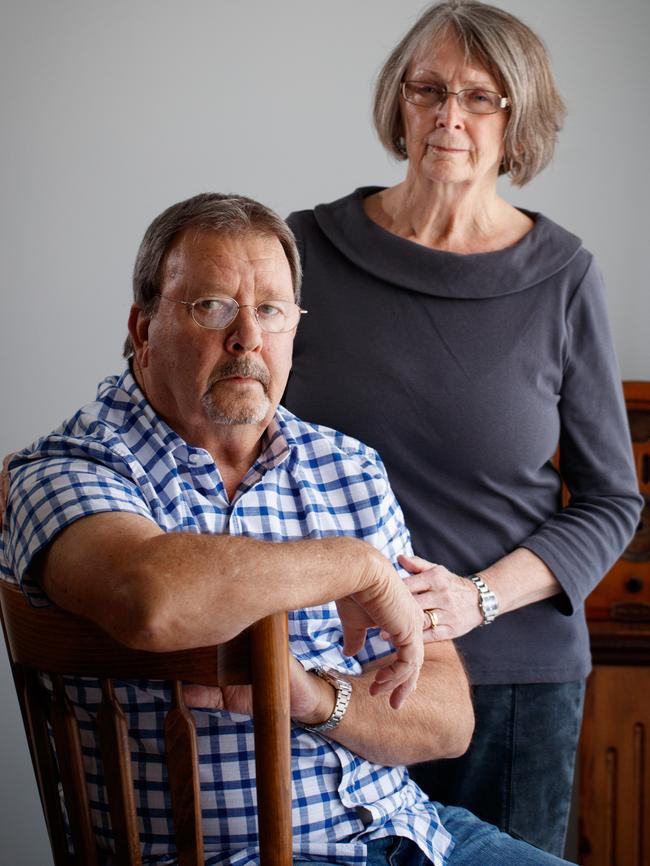Brave chemotherapy bungle victim Bronte Higham dies
THE man whose harrowing testimony moved Premier Jay Weatherill to intervene and offer victims of the chemotherapy bungle compensation has died.

SA News
Don't miss out on the headlines from SA News. Followed categories will be added to My News.
- Victim: I’m dying but no one will say sorry
- Chemo bungle: What price a life?
- Chemo blunder: ‘Cover-up, deception’
THE man whose harrowing testimony moved Premier Jay Weatherill to intervene and offer victims of the chemotherapy bungle compensation has died.
Bronte Higham, 67, whose acute myeloid leukaemia returned in April, died in the early hours of Sunday morning after spending his final weeks in a hospice.
Another victim, Andrew Knox, yesterday praised the bravery of Mr Higham who gave harrowing evidence to a public parliamentary inquiry while facing death.
Only weeks ago Mr Higham’s call for better treatment shamed the State Government into making $100,000 compensation offers to the ten victims or families of the 2014-15 chemotherapy bungle at the Royal Adelaide Hospital and Flinders Medical Centre.
“It is only weeks since Bronte so bravely fronted the parliamentary select committee despite having relapsed,” Mr Knox said.
“(Mr Higham forced) the Premier to intervene through sheer political embarrassment.”
Opposition leader Steven Marshall said Mr Higham was extraordinarily brave to have gone before the select committee when he was so ill.

“He was a courageous man who fought for what he so passionately believed in,” Mr Marshall said. “He deserves the gratitude of the whole state.”
Health Minister Jack Snelling said he was also saddened to hear of Mr Higham’s death and extended the State Government’s condolences to his family.
Calling himself “a dead man walking”, Mr Higham asked that compensation be dealt with so his family — wife Ricki, son Kym and daughter Jodie — would not have to fight after his death.
His death will almost certainly become part of a coronial inquiry already looking into the death of two other chemotherapy bungle victims.
The deputy coroner last month opened an inquest into the death of Chris McRae, 67, who died last November, and Johanna Pinxteren, 76, who died in June, 2015.
Mr Knox said he had been asked by the coroner’s office to notify them of Mr Higham’s death and he understood Mr Higham’s supervising doctor had been asked to do the same.
While welcoming the inquest, which will be heard again today, Mr Knox said only a judicial inquiry could fully examine the chemotherapy bungle and subsequent disclosure of poor governance and a culture of cover up, particularly at the RAH.
Mr Knox said Mr Higham had deserved the best treatment when first diagnosed, and after he relapsed, but neither had happened. Only recently had a care co-ordinator been appointed to manage his treatment.
“I am sure Bronte would want to thank David Morris (acting chief operating officer at FMC) for his concern, care, attention and compassion,” Mr Knox said.
“If only he had that support from the start of his ordeal.”
Mr Knox said there was an overwhelming sense of sadness about his death because he was never given the best chance of surviving a “hideous and unfashionable” cancer.
“It is a relief in that Bronte no longer has to dwell upon his time ticking away,” Mr Knox said.


